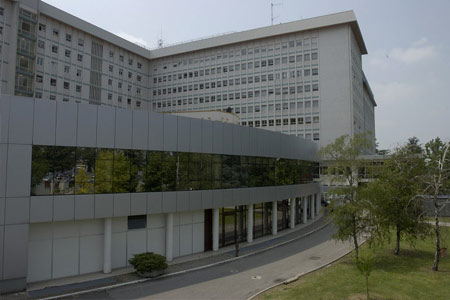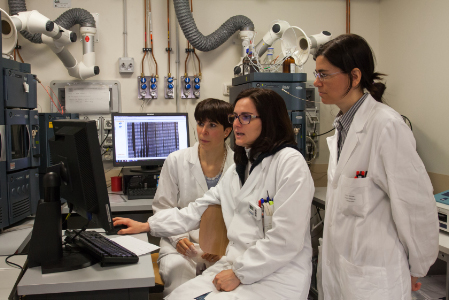- Autori:
-
Bonisoli, Giulio Luigi; Argentino, Giuseppe; Friso, Simonetta; Tinazzi, Elisa
- Titolo:
-
Extracellular Vesicles Analysis as Possible Signatures of Antiphospholipid Syndrome Clinical Features
- Anno:
-
2025
- Tipologia prodotto:
-
Articolo in Rivista
- Tipologia ANVUR:
- Articolo su rivista
- Lingua:
-
Inglese
- Formato:
-
A Stampa
- Referee:
-
Sì
- Nome rivista:
- INTERNATIONAL JOURNAL OF MOLECULAR SCIENCES
- ISSN Rivista:
- 1422-0067
- N° Volume:
-
26
- Numero o Fascicolo:
-
7
- Intervallo pagine:
-
1-14
- Parole chiave:
-
Antiphospholipid syndrome; autoimmune disease; Extracellular vesicles; endothelial cells; endothelium; endothelial damage; CD146; CD42a; annexin V
- Breve descrizione dei contenuti:
- Antiphospholipid syndrome (APS) is a rare autoimmune disease characterized by thrombosis and obstetric complications. Extracellular vesicles (EVs) of either platelet and endothelial origin are recognized to be involved in the pathophysiology of the disease. This study aimed to evaluate the potential role of endothelial- and platelet-derived extracellular vesicles and the clinical features or progression of APS. We enrolled 22 patients diagnosed with APS and 18 age and sex-matched healthy controls. We determined APS-specific antibody positivity and clinical manifestations in APS affected patients, with a focus on neurological, cardiovascular, dermatological, hematological manifestations, and pregnancy-related complications. Platelet-poor plasma was collected from either patients and controls for the analysis of EVs by flow cytometry technology using monoclonal antibodies to specifically identify those derived from either platelets and/or endothelial cells. EVs of endothelial and platelet origins were overall significantly increased in patients as compared to healthy controls. Furthermore, a significant association was also observed between the number of extracellular vesicles and specific organ involvement, particularly central nervous system manifestations, hematological abnormalities, and obstetric complications. An elevated proportion of endothelial-derived EVs in APS and a reduction of resting endothelial cell-derived EVs were observed in APS-affected women with obstetric complications. Our findings highlight the involvement of endothelial cells and platelets in mirroring the activities of endothelial cells and platelets in APS. Additionally, extracellular vesicles may serve as potential predictors of organ involvement and disease-related damage.
- Note:
- Antiphospholipid syndrome (APS) is a rare autoimmune disease characterized by thrombosis and obstetric complications. Extracellular vesicles (EVs) of either platelet and endothelial origin are recognized to be involved in the pathophysiology of the disease. This study aimed to evaluate the potential role of endothelial- and platelet-derived extracellular vesicles and the clinical features or progression of APS. We enrolled 22 patients diagnosed with APS and 18 age and sex-matched healthy controls. We determined APS-specific antibody positivity and clinical manifestations in APS affected patients, with a focus on neurological, cardiovascular, dermatological, hematological manifestations, and pregnancy-related complications. Platelet-poor plasma was collected from either patients and controls for the analysis of EVs by flow cytometry technology using monoclonal antibodies to specifically identify those derived from either platelets and/or endothelial cells. EVs of endothelial and platelet origins were overall significantly increased in patients as compared to healthy controls. Furthermore, a significant association was also observed between the number of extracellular vesicles and specific organ involvement, particularly central nervous system manifestations, hematological abnormalities, and obstetric complications. An elevated proportion of endothelial-derived EVs in APS and a reduction of resting endothelial cell-derived EVs were observed in APS-affected women with obstetric complications. Our findings highlight the involvement of endothelial cells and platelets in mirroring the activities of endothelial cells and platelets in APS. Additionally, extracellular vesicles may serve as potential predictors of organ involvement and disease-related damage.
- Pagina Web:
-
https://www.mdpi.com/1422-0067/26/7/2834
- Id prodotto:
-
145955
- Handle IRIS:
-
11562/1162909
- ultima modifica:
-
24 maggio 2025
- Citazione bibliografica:
-
Bonisoli, Giulio Luigi; Argentino, Giuseppe; Friso, Simonetta; Tinazzi, Elisa,
Extracellular Vesicles Analysis as Possible Signatures of Antiphospholipid Syndrome Clinical Features
«INTERNATIONAL JOURNAL OF MOLECULAR SCIENCES»
, vol.
26
, n.
7
,
2025
,
pp. 1-14
Consulta la scheda completa presente nel
repository istituzionale della Ricerca di Ateneo 








